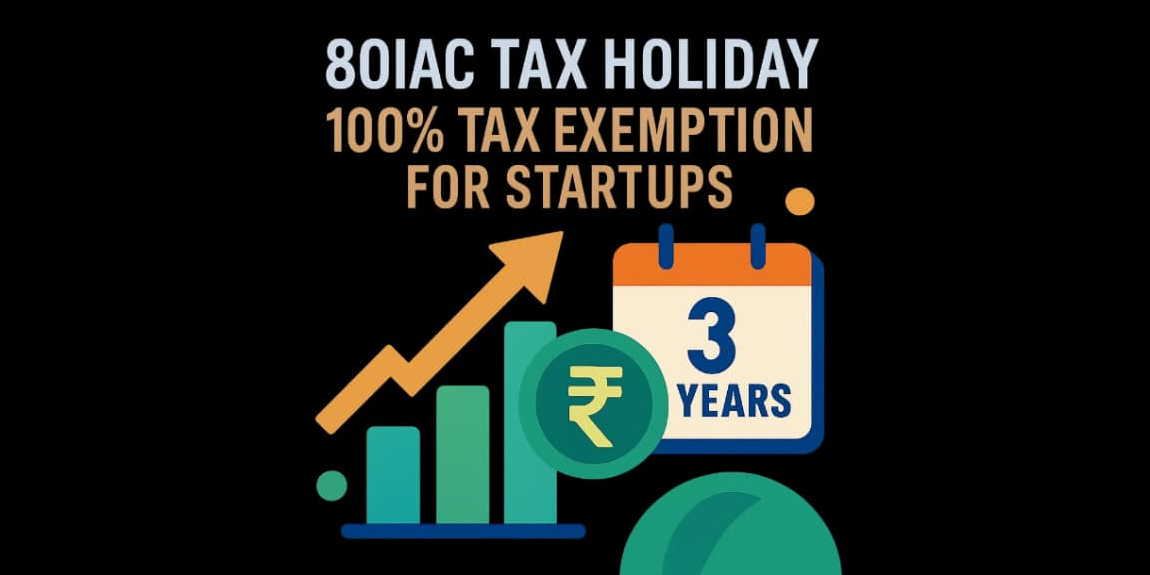Section 80-IAC: Unlocking India’s Tax Holiday for Startups
This provision provides a tax holiday – 100% deduction of profits for 3 years – to eligible startups, allowing them to reinvest every rupee back into their business. However, this relief comes with strict eligibility conditions, and wrong claims may attract scrutiny, disallowance, and penalties.
Let’s break it down step by step.
- If an assessee is an eligible startup, carrying on an eligible business, it can claim 100% deduction of profits and gains derived from such business.
- The deduction can be claimed for any three consecutive assessment years out of ten years from incorporation.
- Effectively, this means:
For three years, your net profit = your reinvestable profit, as you pay zero income tax on it.
This is not just a tax incentive-it’s a recognition by the government of the crucial role startups play in job creation and economic growth.
Who Can Claim – Eligibility Criteria
To avoid misuse, Section 80-IAC clearly defines what qualifies as an “eligible startup” and “eligible business.”
1. Eligible Startup
- Must be incorporated as a Private Limited Company or Limited Liability Partnership (LLP).
- Incorporated between 01-04-2016 and 01-04-2030.
- Turnover must not exceed 100 crore in any previous year relevant to the claim.
- Must hold a valid certificate from the Inter-Ministerial Board of Certification (IMB).
2. Eligible Business
- Must be engaged in innovation, development, or improvement of products, processes, or services.
- Or be a scalable business model with high potential of employment generation or wealth creation.
3. Additional Restrictions
- Startup must not be formed by splitting/reconstruction of an existing business.
- Not formed by transfer of old machinery or plant (except within permitted limits, i.e., up to 20%).
Claiming this deduction is not automatic. It involves multiple steps:
Step 1: Get DPIIT Recognition
- Apply through the Startup India portal.
- Submit incorporation documents, business pitch, and details of innovation.
Step 2: Obtain IMB Certification
- File application before the Inter-Ministerial Board (IMB) for certification as an “eligible business.”
- Provide proof of innovation/scalability.
Step 3: Maintain Proper Books of Accounts
- Since profits claimed as exempt must be substantiated, startups should maintain audited accounts.
Step 4: Choose 3 Consecutive Years
- Within the first 10 years of incorporation, the startup can pick any 3 consecutive years to claim the deduction.
- Example: If incorporated in FY 2020-21, it can claim deduction in FY 2023-24, 2024-25, and 2025-26.
Step 5: Claim in ITR
- Deduction is claimed while filing ITR (ITR-6 for companies, ITR-5 for LLPs).
- Report profits separately under the head “Profits and Gains from Business or Profession.”
- 100% Tax Holiday – Profits reinvested fully into growth.
- Boost to Cash Flow – No outflow on account of income tax for 3 years.
- Investor Confidence – IMB-certified startups are seen as credible.
- Encouragement to Innovate – Helps founders focus on product development instead of tax burdens.
- Flexibility of Timing – Startups can choose 3 years of maximum profitability.
The Income Tax Department carefully scrutinizes claims under Section 80-IAC, as misuse is common. Here are the common reasons for disallowance:
- No IMB Certification – Claiming deduction without obtaining the mandatory certificate.
- Turnover > 100 Crore – Even if a startup was earlier eligible, exceeding this cap makes it ineligible.
- Not an “Eligible Business” – Businesses engaged in trading, real estate, etc., may not qualify.
- Splitting of Existing Business – Forming a new entity by hiving off existing operations.
- Use of Old Machinery beyond 20% – Violates the “new business” condition.
- Improper Accounting – Failure to maintain proper documentation to substantiate profits.
If found ineligible during scrutiny assessment:
- Deduction will be disallowed.
- Tax demand raised with interest u/s 234A/B/C.
- Penalty u/s 270A may apply for under-reporting of income.
- In severe cases, prosecution u/s 276C may also follow.
Suppose TechNovaPvt. Ltd., an AI-based startup incorporated in June 2020:
- FY 2023-24: Profit 2 crore.
- FY 2024-25: Profit 4 crore.
- FY 2025-26: Profit 6 crore.
If TechNova has IMB certification and turnover < 100 crore, it can choose these 3 years for deduction.
Tax Saved:
- At 25% corporate tax rate → 3 crore tax saved across 3 years.
- This 3 crore can be reinvested in expansion.
Now suppose during scrutiny, AO finds TechNova was merely reselling imported software (not “innovation”) → deduction disallowed → entire 3 crore + interest + penalty recoverable.
- CBDT Notification No. G.S.R. 180(E), dated 17-02-2016 – Notified procedure for IMB certification.
- Case Reference:Curefit Healthcare Pvt. Ltd. vs. ITO (ITAT Bangalore) – deduction u/s 80-IAC denied due to lack of IMB certificate.
- CBDT FAQs on Startup India scheme – clarify that only IMB-approved startups can claim.
- Always apply for IMB certification before claiming.
- Ensure turnover consistency with audited financials.
- Maintain documentation of R&D, patents, or innovative processes.
- Consult a tax professional before deciding the 3 years of claim.
- Avoid aggressive claims—scrutiny is common for 80-IAC cases.
Section 80-IAC is not just about tax saving – it’s about giving startups a fair runway to grow. The government recognizes that the initial years are the toughest, and hence provides this 3-year tax holiday.
Yes, compliance is strict, and misuse is penalized, but with proper guidance, startups can:
- Save crores in taxes,
- Attract investors, and
- Scale confidently.
At GrowMax Advisory, we believe every eligible startup should explore this benefit. With the right documentation and advisory, Section 80-IAC can become the launchpad for India’s next unicorns.
